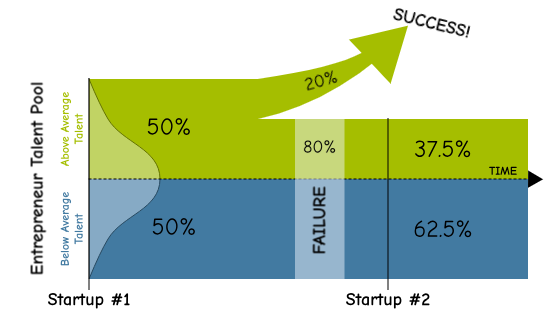It is an old adage among entrepreneurship practitioners and educators that failure is an essential ingredient for future success. Leaders of winning startups often list past failures, pivots, and do-overs as badges of honor gained on the road to profitable venture creation.
Is failure always a good teacher?
Perhaps not.
Earlier this year Gottschalk and Müller of the Leibniz Centre for European Economic Research and the University of Mannheim, Institute for SME Research tackled the idea of startup failure in their report A second chance for failed entrepreneurs: A good idea? Their study compared how long a startup company survived when run by entrepreneurs who previously failed vs. brand new entrepreneurs. They found that startups managed by leaders with prior failures did WORSE than those who were new to entrepreneurship.
What’s going on? The researchers suggest that the group of failed entrepreneurs contains a higher percentage of leaders with “below-average entrepreneurial talent.” As a group they perform worse because the some of the most talented entrepreneurs won previously – diluting the talent pool in the second (or third or fourth) round.

The Takeaway
As entrepreneurship educators, supporters, and advocates, we need to be honest when working with second chance entrepreneurs. Perhaps they failed because of market forces or poor timing, insufficient capital, or other causes. However, they may have failed because they do not currently have what it takes – skills, aptitude, character, etc. – to succeed in a very, very difficult endeavor.
We need to do a good job of helping these entrepreneurs carefully triage their past experience, explore the root causes of prior failure, and evaluate the role entrepreneurial talent deficiencies may have played in the eventual outcome. Those are hard, but essential, conversations. Once understand, specific talent deficiencies can be addressed through training, mentorship, and partners.
The Study
Gottschalk, S., & Müller, B. (2022). A second chance for failed entrepreneurs: A good idea? Small Business Economics, 59(2), 745-767. doi:https://doi.org/10.1007/s11187-021-00584-4
See Also: Harrell, E. (2020, May). Maybe failure isn’t the best teacher. Harvard Business Review, Retrieved from https://www.proquest.com/magazines/maybe-failure-isnt-best-teacher/docview/2403116176/se-2
